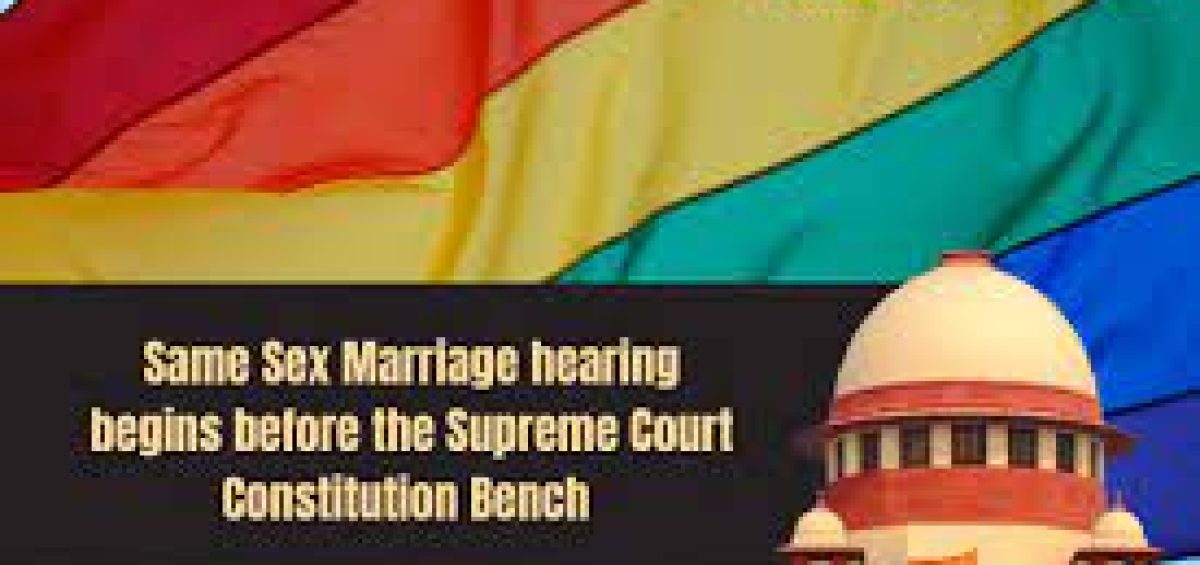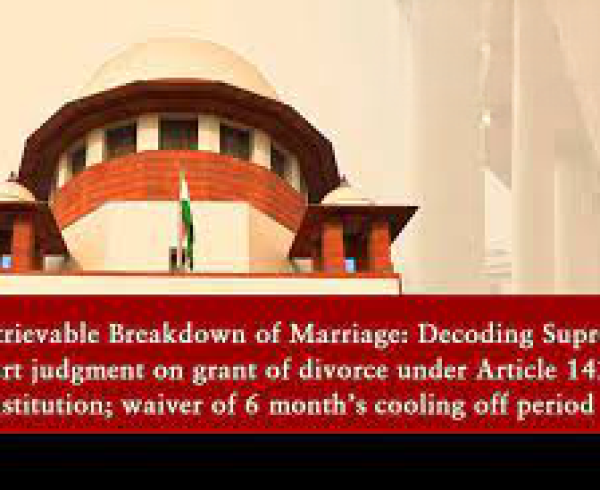Petitioner contended that they were entitled to the Fundamental Right to marry which was entrenched in the Constitution which includes the choice of a marital partner. Neither the State nor Society could intrude into the domain of individual right to pursue a way of life which were central to their identity and autonomy.
Supreme Court: The Constitution bench comprising of Dhananjaya Y. Chandrachud, CJ, Sanjay Kishan Kaul, S. Ravindra Bhat, Hima Kohli and Pamidighantam Sri Narasimha J.J., commences hearing dated 18-04-2023, of batch of petitions seeking legal recognition of same sex marriage.
In the matter at hand, the petitioners had sought recognition of same-sex marriages in the year 2022 under several acts, including the Special Marriage Act, 1954 (‘SMA 1954′), the Foreign Marriage Act, 1969 (‘FMA 1969′) and the Hindu Marriage Act, 1955 (‘HMA 1955′) and the same be made gender neutral.
The petitioners claimed to have faced tremendous adversity, owing to their same-sex relationship, facing disapproval from family, and also suffering gave threats of violence and harassment from people at large. The petitioners had managed to get interim police protection from the Delhi High Court vide order dated 12-04-2019 in the case of Bhawna v. State Writ Petition (Criminal) 1075 of 2019, yet they were continued to be harassed, resulting in tremendous instability in their lives and harm to their education and employment prospects. They sought to be legally allowed to be married and ensure that their relationship was formally recognised since they continue to face exclusionary, discriminatory, and unconstitutional requirement of SMA,1954 and legislations alike which only permits marriage between a man and a woman.
The petitioners submitted that even though they were not being able to live their lives jointly de jure but doing it de facto makes it a herculean task to access even basic services like putting their partner’s name as a nominee in insurance or bank accounts. Further, it was pointed out that there were no discussions on the possibility of marriage amongst the LBGTQIA+ persons during the legislative deliberations. The petitioners challenged inter alia the constitutional vires of Section 4(c) of the SMA, 1954 to the extent that it does not recognise marriages between LGBTQIA+ couples, and a consequent direction that the words “wife” and “husband” be read as “party” in the context of marriages involving LGBTQIA+ persons.
The petitioners also sought to declare that the requirements of mandatory notice, domicile requirement, publication of notice, and invitation of objections stipulated under Sections 5 — 8, SMA, 1954 were unconstitutional and ought to be struck down since the aforementioned technicalities made it virtually impossible for the individuals, particularly from inter-faith backgrounds, to access the institution of civil marriage. The Law Commission of India in its successive reports in 1974, 2008 and in 2012 had called for amendment or removal of notice and domicile requirement under SMA, 1954, in order to facilitate marriages under the SMA, 1954
It was contended that the petitioners were entitled to the Fundamental Right to marry which was entrenched in the Constitution which includes the choice of a marital partner. Neither the State nor Society could intrude into the domain of individual right to pursue a way of life which were central to their identity and autonomy, except for a compelling State interest. The intention of the legislatures while drafting SMA, 1954 was to provide civil form of marriage to all Indians, irrespective of faith or religion, and to release individuals from the restrictions of religious law, custom and practice. To deny the petitioners access to the institution of civil marriage under SMA, 1954 solely on the ground of their sexual orientation amounts to discrimination, which is prohibited under Article 14 of the Constitution.
It was argued that the rights and obligations associated with marriage are multifold, as marriage is an important facet of the socio-economic security of the parties which includes matters relating to inheritance and succession, medical insurance, adoption, access to post-death claims, spousal privilege, authority to take medical decisions, survivors’ rights and benefits, workers’ compensation, income tax, and child custody, amongst others. Exclusion of the petitioners from SMA, 1954 not just interferes with their fundamental right to marry, but also denies them the plethora of rights and entitlements that the State provides to the heterosexual married couples. Same-sex marriage exclusion was a sex stereotype that marriage was essentially a union between a cis man and a cis woman, which was prohibited under Article 15(1) of the Constitution.
It was further argued that the right to adopt, or have children by surrogacy or assisted reproductive technology, and automatic rights to inheritance, maintenance, and tax benefits were available only to married couples, who were also entitled to benefits under a host of employment statutes. The petitioners pointed out that they will not be able to avail legally accrued benefits of laws such as The Transplantation of Human Organs Act, 1994 as it only allows near relatives to object to the use of a deceased’s body for therapeutic purposes or organ donation. Even Section 80 of the Income Tax Act, 1961, provides for a deduction of certain sums for computing the total income of an assessee, when such sums are paid on behalf of a spouse.
Navigating through the FMA, 1969, the petitioners stated that the legislation intent was to validate marriages solemnised by Indian citizens in foreign countries as far as possible, and not to invalidate them. Therefore, denying the petitioners registration of their marriage under Section 17, FMA, 1969 solely on the ground of their sexual orientation was impermissible and unconstitutional. The petitioners challenged inter alia the constitutional vires of Section 17(2) read with Section 4(c) of the FMA, 1969 to the extent that they do not recognise marriages between LGBTQIA+ couples, and a consequent direction that the words “bride” and “bridegroom” be read as “party” in the context of marriages involving LGBTQIA+ persons.
The petitioners also sought to declare that the requirements of mandatory notice, domicile requirement, publication of notice, and invitation of objections stipulated by Sections 5, 6, 7, 8 and 10 of the FMA, 1969 were unconstitutional and be struck down. The petitioners further challenged the Regulations 5(2)(a) and (3) read with Schedules II, III, VI and VII of the Adoption Regulations, 2022 that excluded same-sex couples from joint adoption under Juvenile Justice (Care and Protection of Children) Act, 2015 (‘JJ Act’) by requiring the applicant couples to be in a heterosexual marriage for two years. They sought a consequent direction that the reference to an applicant couple’s marital status under Regulations 5(2)(a) and (3) of the Regulations be read to include same-sex couples who were validly married in a foreign jurisdiction as well as to include unmarried same-sex couples within the ambit of the term ‘spouse’ used in Section 57(2) of the JJ Act.
The impugned Regulations place same-sex prospective adoptive parents who have been married under foreign law at a disadvantage compared to heterosexual married couples in matters of joint adoption, solely on the basis of the former’s sexual orientation. While heterosexual married couples face no challenge proving that they are a married couple under Indian law, this is virtually an impossibility for prospective adoptive parents like the petitioners whose marriage was not legally recognized in India. If they adopt under the impugned provisions, one of the petitioners must forsake a legal relationship with the child, which was antithetical to their right to a family life and motherhood that are facets of the right to life as well as to the directive principle of state policy of giving children opportunities and facilities to develop in a healthy manner and in conditions of freedom and dignity and protecting childhood and youth, inter alia, from material abandonment.
Landmark Precedents:
Supreme Court’s judgments in Lata Singh v. State of UP (2006) 5 SCC 475, Shafin Jahan v. Asokan KM (2018) 16 SCC 368, and Laxmibai Chandaragi B. v. The State of Karnataka (2021) 3 SCC 360, stated that an adult person has the right to marry a person of their choice under Article 21 of the Constitution.
It was contended that the Supreme Court always protected inter-faith, inter-caste couples when they chose to marry and drew attention to the 2017 ruling in KS Puttaswamy vs Union of India (2017) 10 SCC 1, where a nine-judge Bench observed that the rights of LGBTQ persons cannot be construed as being ‘so-called rights’, but are real rights founded on sound constitutional doctrine. A year later, in Navtej Johar v. Union of India (2018) 10 SCC 1, the Supreme Court held that the members of the LGBTQ community were entitled to the ‘full range of constitutional rights including the liberties protected by the Constitution’.
National Legal Services Authority v. Union of India (2014) 5 SCC 438 had upheld the fundamental rights of LGBTQIA+ persons to equality, non-discrimination, freedom of expression, privacy, dignity, autonomy, and health guaranteed under Articles 14, 15, 19 (1) and 21 of the Constitution. Thus, their exclusion from the institution of marriage and its concomitant status, rights and entitlements that are available to heterosexual couples in India is incompatible with our Constitution.
[Supriyo v. Union of India, Writ Petition (Civil) 1011 of 2022, heard on 18-04-2023]






Leave a Comment